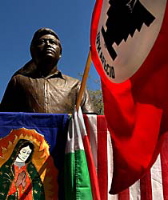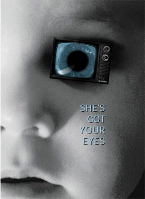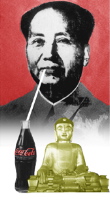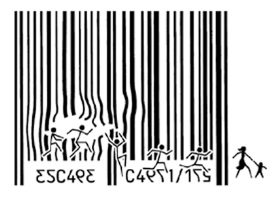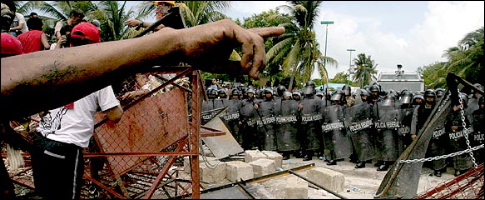The class meets three times a week, for an hour-and-a-half. Attendance
and punctuality are mandatory (absences & tardiness will be
penalized).
I)
SANDERSON & ALDERSON CHAPTER TESTS. Dr. Santos will lecture on, and devote a whole class
session to, each of the 11 chapters of the Sanderson
& Alderson textbook, usually once a week. Using the campus
web-based WebCT
testing service, students must take a test (or two) on each of the
chapters, and they must do so during the same week period Dr. Santos
lectures on each of them, no later than midnight of each Sunday in
question -- EXCEPT for the tests for the FIRST FOUR CHAPTERS, all of
which may be taken anytime up to midnight, Sunday, January 23.
Students may take up to two tests per chapter to improve their scores
(the final chapter score equals the average of the two test scores).
Each test consists of 20 multiple choice questions; the student has one
hour to complete it. Below are more detailed instructions on how to
take these tests.
II) WEB READING REPORTS.
Dr. Santos will also lecture on each of the 7 web readings assigned -
usually once a week, too. On those days (see schedule below) students
must come to class prepared to discuss the assigned
web reading for the day. To ensure that they do, on those days students
must bring to class a written "
reading
assessment," of no
more than two pages, of the
assigned web reading for the day. No
late reading assessments will be accepted, unless the students has
previously arranged an
authorized absence from Dr. Santos.
These reading assessments must
not summarize or describe the
readings,
but must
personally and critically respond to them,
express what the student
thinks
about them; the students should identify the
areas
of strong
agreement and
disagreement
with
the author, explaining why they feel that way, as well as raise
questions, or
anything in particular that caused them amazement, perplexity, or
surprise.
Whatever you write, you should explain your
specific
analytical and
personal reasons for doing so.
The
reading
assessment need not
cover
every issue found in the assigned reading for the day, but it should
demonstrate
that you read it and that you
chose
well what to comment on. A very bad assessment will
reveal the student read
very little or very
superficially just to do the assignment (it's called "going through the
motions"). A good
assessment
will demonstrate the student really read all the material and did a
serious
effort to chose and critically grapple with the main issues involved.
At the end
of the reading
assessment,
students should always list a couple of questions or issues for class
discussion. Dr. Santos will randomly select a couple of students to
read their assessments and/or questions in the discussion period.
Please
put on top of your reading assessments your name, the date, and the
reading you are assessing.
To access the web readings, click on their links placed in the
schedule below. Once you do that, you will be prompted to enter a
username
and a password (only once
per session); these two access codes are generic (meaning they are the
same for
everyone) and will be announced in class. (Please
note:
these web readings' access codes are different
from the
username and password you have
been
individually assigned to access WebCT testing.)
III. STUDENT CLASS PRESENTATIONS.
All students must read all the articles from the Mertes anthology and
come prepared to discuss them on their assigned dates (see schedule
below), preferably with a couple of questions for discussion (no
written assessments need to be submitted for these readings). Most of
these articles consist of personal interviews or testimonies of leaders
of contemporary social movements. On the days we discuss these
articles, always two at a time, two students will make class
presentations (on an article each). Each presentation, at least
15 minutes and no more than 30 minutes in duration, will cover the following areas: (1)
IDENTIFY AND PLACE THE MOVEMENT IN CONTEXT: Student must previously
research and then present a summary of the historical origins, social composition, location, and
size/strength, goals,
history of movement actions,
main achievements, failures,
current challenges of the the movement in question; (2) SUMMARY
OF THE ARTICLE: identify main points, select and share the most
interesting quotes (3) CRITICAL ASSESSMENT OF THE ARTICLE: Your overall
assessment and the questions it raises.
Note:
Students will be allowed to select which article to present on a
first-come-first-served basis.
IV. RESEARCH TERM PAPER. Each student
will design, research,
and write a term paper, to be completed
and delivered in bound, written form no later than noon, Friday, March
18.
Students
must obtain approval from Dr. Santos on the topic for their research
paper. Each research paper
should
be 6 to 8 pages long (apart from the bibliography and any appendix),
double-spaced, font 12, one-inch margins. For the
guidelines
on how to write a good research term paper go to: http://www.csub.edu/~gsantos/Guide-Paper.html.
[BIG
TIP: IF YOU SELECT A RESEARCH PAPER TOPIC RELATED TO YOUR CLASS
PRESENTATION, YOU CAN APPROACH THE LATTER AS A FIRST DRAFT OR
EXPLORATORY RESEARCH FOR THE FORMER - AND SAVE LOTS OF TIME AND DO MUCH
BETTER ON BOTH!]
V. GRADING:
The chapter tests from the Sanderson &
Alderson book are collectively worth 55 points (5 points per chapter
score); the reading assessments of the web readings are collectively worth 14 points
(2 points per assessment); the class presentation is worth 10 points;
the research term paper is worth 20 points. Perfect attendance will be
rewarded with 3 extra points (and a point is lost for each absence).
The final letter
grade will be assigned, on a
scale
of 0 to 100, as follows:
| 94-100 = A |
87-89 = B+ |
77-79 = C+ |
65-69 = D |
| 90-93 = A- |
84-86 = B |
74-76 = C |
< 65 = F |
|
80-83 = B- |
70-73 = C- |
|
VI. OFFICE HOURS: All
students are
encouraged to
visit Dr. Santos regularly during his posted office hours, especially
to
ensure
their research project topics and their class presentations
are
well chosen or well organized, or to discuss anything related to the
texts
or the class lectures/videos/discussions. Phone
calls during office hours are also encouraged when students can't come.
Very brief and to the
point
e-mail messages to Dr. Santos (NOT a substitute for office visits or
calls,
please)
may be sent to: santos_class@csub.edu,
but do not expect longish answers to longish questions.
Instructions
on Taking Quizzes and
Tests at CSUB's WebCT
To
access and
take any given chapter test go to the CSUB WebCT site (bookmark the URL address):
http://webct.csub.edu/
If you are doing it from
an off campus computer, make sure your browser is properly
configured (click around WebCT support links and read how you can ensure
your browser is properly configured).
You will need to know your WebCT ID and password.
All CSUB enrolled students have a
"Runner" email account. Your WebCT
ID is the same as your Runner Mail Logon ID -- that is, whatever prefix goes before
the "@runner.csub.edu" domain. For example, the WebCT ID for John
Smith (jsmith4@runner.csub.edu) would be jsmith4. Your initial WebCT password is the last
five digits of your Student I.D. Number (or Social Security Number for
some).
Once logged on to WebCT, you will be asked to change it immediately (if
you have used WebCT before you'll need to enter your old password).
Choose an easy to remember, easy to type new password. We also suggest
that you set up your login hint
immediately - and write all these codes somewhere where you will not
loose them, nor expose them to theft by others.
If you need
help: If you don't know your CSUB RunnerMail Logon ID or if
you've changed your password and have forgotten it, contact the Student Help Desk at 664-2315, or the Student Technology Help Desk in the library at (661) 665-6677 or go
to Lower
Level Room 1 during office hours.
Be prepared! The maximum duration for each chapter
test is 60 minutes. After
each test deadline, access to any given chapter test will be closed
and no late testing will be possible. So make sure you have prepared
well, chosen a day, time & place well, and have ample time and
tranquility (with no
distractions) to begin testing; take time to read carefully
each question before you answer it - do not rush! (a common
mistake). You may take the test with the open book, but exclusively on
your own, please. Never plan to take a test in two or more
sittings; plan always to take
each test in a single session
(the computer usually freezes incomplete tests).
Save your
answers. You
must save each and every answer, then the whole test. Score and correct
answers are displayed immediately following taking a test. So, if
you change your mind on a specific answer, don't forget to save
it again! And don't forget to send your quiz/test to grade
when you are completely done (lots of students forget this last step
and their
scores are not computed!).
Security
precaution: If you are using a public computer always quit both
the WebCT site and the browser (Netscape or Explorer) after you
are done with testing -- otherwise, someone may access your own
WebCT account and "try out" some tests! This is because your access
codes stay active until you quit the browser. And remember, never
share your testing access codes with anyone!
Warning: Students are hereby formally forewarned that anybody
caught cheating on the tests will automatically fail the course. WebCT
has a monitoring capability that automatically "flags" for instructors
a variety of potential cheating cases and situations -- including
comparing student answers, times of testing, etc.

